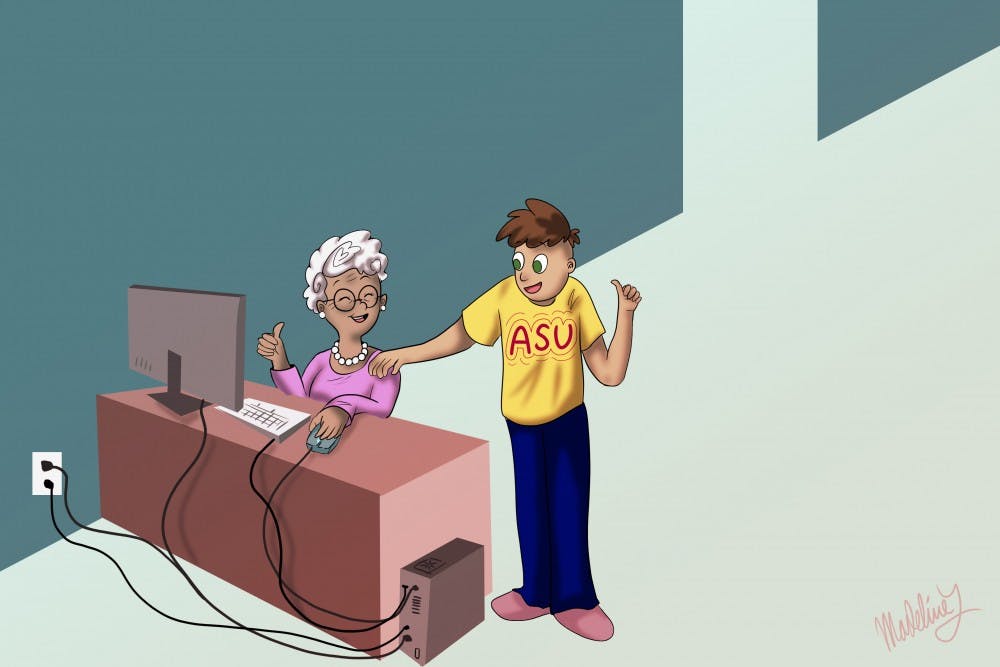TECtogether is a nonprofit organization based in Gilbert, Arizona, which oversees volunteers from BASIS Chandler visiting elderly homes to teach senior citizens about technology.
Its goal is to bridge the generational gap as well as the prevalent digital divide among families within their community. Many children and grandchildren fall out of touch with their older loved ones as they age and become busier.
Most elderly individuals want to be connected digitally but do not have the means to do so, Simar Wadhwa, an ASU freshman studying business law in the W.P. Carey School of Business, said.
“That’s where we come and play a part to bridge that gap and make sure that they have the means to connect with the younger generation ... to be with them and talk to them.”
Wadhwa and Shivam Sadachar, a fellow freshman studying computer science, began the project their sophomore year of high school when they recognized they had lost contact with their elderly family members.
“We had this issue in our lives where we were disconnected with our grandparents, and we realized this is an issue across the nation," Sadachar said. "It’s even right in our backyard – in the community centers and our own city."
They believed the issue was most prevalent in senior living facilities, where the elderly are left alone, disconnected from family members and are scarcely able to see their loved ones throughout the year.
Unfortunately, very few people have the patience to teach technology to the elderly, said Wadhwa, which makes the organization’s role critical for seniors who want to remain close to their families while living in assisted-care facilities.
Wadhwa thought of the idea while seated on a train to New York City, next to an elderly man who asked him for help Skyping his family. When Wadhwa asked what he needed help with, the man replied that he didn’t know how to log in.
“For the next 45 minutes, I just taught him how to use Skype," Wadhwa said. "Simply logging in took 45 minutes, and once we got on, he was able to Skype his great granddaughter."
That was something the elderly man had never had the opportunity to do before, Wadhwa said. Even something as small as showing someone how to log in can be a gratifying experience.
In this moment, Wadhwa imagined how much teaching technology could impact others. He brought Sadachar on board, and they immediately began calling up senior living facilities, asking them to take a chance on the idea.
GIF by Masha Safina
They called the largest senior living facility in Gilbert, which decided to try out technology classes.
“We knew that we wanted to be a nonprofit, but we knew that we get absolutely nothing out of it except for the joy of helping senior citizens,” Wadhwa said.
They said they simply wanted to create real change within their community.
Their nonprofit’s funding comes from calls to family members, door-to-door fundraising and from donors on their GoFundMe page. They want to make sure that they can provide the best experience for their students, the senior citizens.
The selection process for their volunteers reflects this mindset.
Their volunteers need to be good teachers with a lot of patience and must be able to make technology accessible to their students.
“Senior citizens aren’t always willing to learn about things that aren’t necessary,” Wadhwa said.
Out of 18 interested high school applicants, only two were selected to volunteer in the senior living facilities.
The volunteers teach technology classes about Skype, email and even YouTube. Sameer Channar, a senior high school student at BASIS Chandler, is a volunteer for TECtogether.
“My favorite lesson was helping one of the residents at the center send an email to her grandson," Channar said. "It was really powerful because it’s similar to how I connect with my own grandparents in India."
His grandparents really value having a connection with him, and he enjoyed helping foster that same connection for other members of the community.
“We hope (people) get inspired by our story so they can start their own technology courses at other facilities,” Sadachar said.
They hope to see their idea expand to other communities throughout the Valley and eventually nationwide.
Reach the reporter at dsimari@asu.edu or follow @daniellasimari on Twitter.
Like State Press on Facebook and follow @statepress on Twitter.





